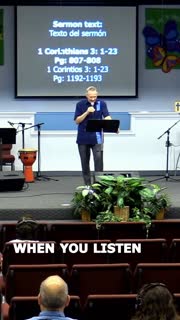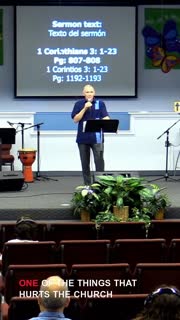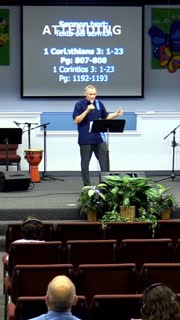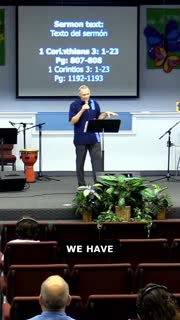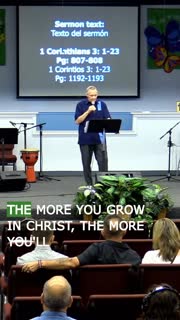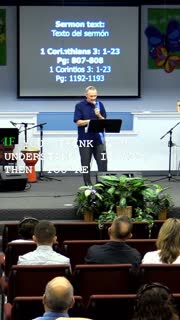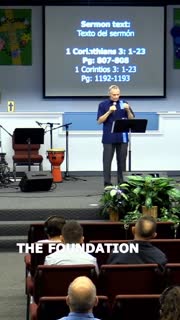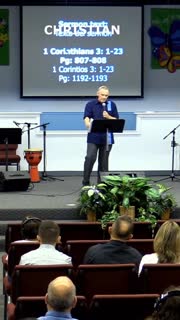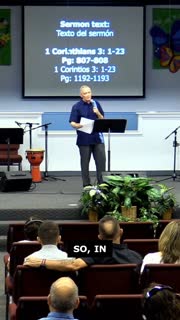Building Unity and Maturity in Christ's Church
Summary
### Summary
Good morning, everyone. Today, we delved into 1 Corinthians 3:1-23, exploring the importance of spiritual maturity and unity within the church. We began by acknowledging the challenges and distractions that can affect our focus, but emphasized the significance of truly listening to God's Word and not just treating it as advice. We discussed the necessity of investing time and effort into understanding Christianity deeply, rather than dabbling superficially.
One of the main points was the inconsistency and hypocrisy that can plague the church when Christians do not live out their faith consistently. We highlighted the importance of following Jesus wholeheartedly, not just on Sundays, but every day of the week. This involves engaging in small group Bible studies and fostering a deep sense of spiritual family within the church.
We also touched on the issue of celebrity culture within Christianity, where people tend to follow charismatic leaders rather than Jesus. Paul addressed this in his letter to the Corinthians, urging them to focus on Christ as the foundation of their faith. We emphasized that our faith should not be based on personalities but on the truth of Christ's death, burial, and resurrection.
Furthermore, we discussed the importance of building on the foundation of Christ with quality materials—biblical principles—rather than superficial elements that will not withstand the test of time. This involves understanding and living out the deeper truths and doctrines of the Bible, rather than just knowing the stories.
Finally, we stressed the importance of unity within the church. Just as a symphony orchestra tunes to the first chair violinist, we must all tune our lives to Jesus. When we are all in tune with Him, we will experience harmony and unity within the church, which will attract others to the faith.
### Key Takeaways
1. True Listening to God's Word: It's crucial to listen to God's Word not just as advice but as truth to be believed and followed. This requires a deep commitment to understanding and applying biblical principles in our lives, rather than treating them as optional suggestions. [32:40]
2. Consistency in Christian Living: The inconsistency and hypocrisy of Christians can harm the church's witness. We must strive to live out our faith consistently, not just on Sundays but every day, reflecting Christ in all aspects of our lives. [36:09]
3. Avoiding Celebrity Culture: Our faith should be based on Jesus, not on charismatic leaders or personalities. When we focus on following people rather than Christ, it leads to division and spiritual immaturity. [47:41]
4. Building with Quality Materials: We must build our faith on the foundation of Christ using quality materials—biblical principles and truths. Superficial elements will not withstand the test of time and will ultimately fail. [50:45]
5. Unity in the Church: Just as a symphony orchestra tunes to the first chair violinist, we must all tune our lives to Jesus. When we are all in tune with Him, we will experience harmony and unity within the church, which will attract others to the faith. [01:23:02]
### YouTube Chapters
[0:00] - Welcome
[30:08] - Introduction and Scripture Reading
[31:06] - Importance of Listening to God's Word
[32:40] - True Listening to God's Word
[33:43] - Commitment to Understanding Christianity
[35:00] - Consistency in Christian Living
[36:09] - Hypocrisy and Its Impact
[37:06] - Living Out Faith Daily
[37:52] - Importance of Small Group Bible Studies
[38:32] - Spiritual Family and Relationships
[39:22] - Loving Christ First
[40:19] - Loving Others Better Through Christ
[41:46] - Early Church Community
[42:22] - Division in the Corinthian Church
[43:06] - Unity and Harmony in the Church
[44:44] - Avoiding Division Over Minor Issues
[46:06] - Following Jesus, Not Personalities
[47:41] - Celebrity Culture in Christianity
[50:45] - Building with Quality Materials
[52:33] - Prioritizing Time with God
[53:36] - Moving Beyond Bible Stories
[56:07] - Deepening Understanding of God's Word
[57:18] - Challenges of College and Faith
[58:27] - Addressing Celebrity Culture
[59:36] - Overcoming Division
[01:00:39] - Servants of Christ
[01:02:13] - Spiritual Gifts and Service
[01:03:54] - Foundation of Christ
[01:05:08] - Building Carefully on the Foundation
[01:09:51] - Accountability and Judgment
[01:10:24] - Unity in the Church
[01:13:00] - Plurality of "You" in Scripture
[01:14:04] - Local Church Context
[01:15:21] - Substance vs. Form
[01:18:24] - Avoiding Division Over Non-Essentials
[01:19:31] - Learning from Others While Following Christ
[01:21:21] - Christian Maturity and Harmony
[01:23:02] - Tuning to Jesus
[01:25:01] - Prayer and Conclusion
Study Guide
### Bible Study Discussion Guide
#### Bible Reading
1 Corinthians 3:1-23
#### Observation Questions
1. What does Paul mean when he refers to the Corinthians as "infants in Christ" in 1 Corinthians 3:1-2? How does he describe their spiritual maturity? ([48:44])
2. According to the sermon, what are some of the main issues that Paul addresses in the Corinthian church? ([36:09])
3. How does Paul describe the role of leaders like himself and Apollos in 1 Corinthians 3:5-9? What is the significance of this description? ([01:01:10])
4. What analogy does Paul use to describe the foundation of faith in 1 Corinthians 3:10-15, and what materials does he mention? ([01:05:08])
#### Interpretation Questions
1. Why does Paul emphasize the importance of building on the foundation of Christ with quality materials? What might these "quality materials" represent in our lives? ([50:45])
2. How does the sermon explain the impact of inconsistency and hypocrisy among Christians on the church's witness? ([36:09])
3. What are the dangers of a celebrity culture within Christianity, according to the sermon and 1 Corinthians 3:4-5? How can this lead to division and spiritual immaturity? ([47:41])
4. How does the analogy of a symphony orchestra tuning to the first chair violinist relate to the concept of unity in the church? ([01:23:02])
#### Application Questions
1. Reflect on your own life: Are there areas where you treat God's Word more like advice rather than truth to be followed? How can you deepen your commitment to understanding and applying biblical principles? ([32:40])
2. In what ways can you strive for greater consistency in living out your faith daily, not just on Sundays? Identify one specific change you can make this week. ([36:09])
3. Have you ever found yourself following a charismatic leader more than Jesus? How can you refocus your faith on Christ as the foundation? ([47:41])
4. What are some "quality materials" (biblical principles) you can use to build your faith? How can you incorporate these into your daily life? ([50:45])
5. Think about your role in fostering unity within the church. How can you contribute to harmony and avoid division over minor issues? ([44:44])
6. How can you engage more deeply in the life of your local church, perhaps through small group Bible studies or other forms of community involvement? ([37:52])
7. Identify one person in your church or community who might feel disconnected or isolated. What specific action can you take this week to reach out and build a deeper sense of spiritual family? ([38:32])
Devotional
Day 1: Listening to God's Word as Truth
True listening to God's Word means treating it as absolute truth, not just advice. This requires a deep commitment to understanding and applying biblical principles in our lives. Many people hear God's Word but fail to internalize and act upon it. To truly listen, one must engage with the Scriptures, meditate on them, and let them transform their heart and mind. This involves a daily practice of reading, reflecting, and praying over the Word, allowing it to guide decisions and actions.
When we treat God's Word as optional advice, we miss out on the transformative power it holds. The Bible is not just a collection of stories or moral guidelines; it is the living Word of God, meant to shape our lives and draw us closer to Him. By committing to a deeper understanding and application of Scripture, we align ourselves with God's will and experience spiritual growth. [32:40]
Hebrews 4:12 (ESV): "For the word of God is living and active, sharper than any two-edged sword, piercing to the division of soul and of spirit, of joints and of marrow, and discerning the thoughts and intentions of the heart."
Reflection: Think about a recent Bible passage you read. How can you apply its teachings to a specific situation in your life today?
Day 2: Consistency in Christian Living
Living out our faith consistently is crucial for maintaining the integrity of our witness as Christians. Inconsistency and hypocrisy can harm the church's reputation and hinder its mission. True Christian living involves reflecting Christ in all aspects of our lives, not just on Sundays. This means embodying Christian values in our work, relationships, and daily interactions.
Consistency in faith also involves participating in small group Bible studies and fostering a sense of spiritual family within the church. These practices help us stay accountable and grow together in our faith. By living out our faith daily, we demonstrate the transformative power of the Gospel and attract others to Christ. [36:09]
James 1:22-24 (ESV): "But be doers of the word, and not hearers only, deceiving yourselves. For if anyone is a hearer of the word and not a doer, he is like a man who looks intently at his natural face in a mirror. For he looks at himself and goes away and at once forgets what he was like."
Reflection: Identify one area of your life where you struggle with consistency in your faith. What practical steps can you take to align this area with your Christian values?
Day 3: Avoiding Celebrity Culture in Christianity
Our faith should be centered on Jesus, not on charismatic leaders or personalities. When we focus on following people rather than Christ, it leads to division and spiritual immaturity. The early church in Corinth faced similar issues, with members aligning themselves with different leaders instead of uniting under Christ.
To avoid this, we must prioritize our relationship with Jesus and base our faith on His teachings and example. This involves discerning the difference between human wisdom and divine truth, and ensuring that our spiritual growth is rooted in Christ alone. By doing so, we foster unity within the church and avoid the pitfalls of celebrity culture. [47:41]
1 Corinthians 1:12-13 (ESV): "What I mean is that each one of you says, 'I follow Paul,' or 'I follow Apollos,' or 'I follow Cephas,' or 'I follow Christ.' Is Christ divided? Was Paul crucified for you? Or were you baptized in the name of Paul?"
Reflection: Reflect on any Christian leaders you admire. How can you ensure that your admiration for them does not overshadow your devotion to Christ?
Day 4: Building with Quality Materials
Building our faith on the foundation of Christ requires using quality materials—biblical principles and truths. Superficial elements, such as cultural trends or personal preferences, will not withstand the test of time. Instead, we must delve into the deeper truths and doctrines of the Bible, allowing them to shape our beliefs and actions.
This involves moving beyond a surface-level understanding of Scripture and seeking a deeper, more comprehensive grasp of God's Word. By doing so, we build a faith that is resilient and enduring, capable of withstanding challenges and trials. [50:45]
1 Corinthians 3:12-13 (ESV): "Now if anyone builds on the foundation with gold, silver, precious stones, wood, hay, straw—each one's work will become manifest, for the Day will disclose it, because it will be revealed by fire, and the fire will test what sort of work each one has done."
Reflection: Consider your current spiritual practices. Are there any areas where you are relying on superficial elements rather than deep biblical truths? How can you strengthen these areas?
Day 5: Unity in the Church
Unity within the church is essential for creating a harmonious and attractive community of believers. Just as a symphony orchestra tunes to the first chair violinist, we must all tune our lives to Jesus. When we are aligned with Him, we experience harmony and unity within the church, which draws others to the faith.
This unity is achieved by focusing on Christ and His teachings, rather than on minor differences or personal preferences. By prioritizing our relationship with Jesus and seeking to reflect His love and grace, we create a welcoming and unified church community. [01:23:02]
Ephesians 4:3-6 (ESV): "Eager to maintain the unity of the Spirit in the bond of peace. There is one body and one Spirit—just as you were called to the one hope that belongs to your call—one Lord, one faith, one baptism, one God and Father of all, who is over all and through all and in all."
Reflection: Think about a recent disagreement or division within your church community. How can you contribute to resolving it and promoting unity in Christ?
Quotes
1. "When you listen to a sermon, are you listening just to hear what I have to say about it? Or are you listening, really listening to see what the text says, what God really says? And is the Word of God just advice for you to consider following or rejecting? Or is it truth to be believed and followed, whether you like it or not?" [32:40] (38 seconds)
2. "One of the things that hurts the church the most, probably the number one thing that hurts the church the most, is the inconsistency and even outright hypocrisy of Christians. When we say one thing on Sunday do something else through the week. We're in this sermon series through First Corinthians. And I did not make a flyer for this, but if I had made a flyer for this sermon series, the title would have been, this church is really messed up." [36:09] (52 seconds)
3. "Attending worship on Sunday is important. The Bible teaches it. We're supposed to do this. But it's just one small part of living the Christian life. Do you know what an hour on Sunday is at church? It's one hour. Well, for us, it's usually about an hour and a half. Out of 168 hours in a week. How are you doing with the other 167?" [37:06] (31 seconds)
4. "We have tried for decades here at Northwest to foster an atmosphere of spiritual family that goes even deeper than physical family. And what I just said, this is difficult to understand for those who have yet to follow Jesus. And it's hard for even some Christians to fully grasp. But the relationships of our spiritual family should be even deeper. Than the relationships of our physical family." [39:22] (35 seconds)
5. "The more you grow in Christ, the more you'll reflect him and his wisdom and love. The less you grow in Christ, the more you reflect the wisdom of the world. Immature Christians live on. Bible stories. David killed Goliath. Moses led the people through the Red Sea on dry ground. Think of your favorite Bible stories. You could probably tell it. But mature Christians live on biblical truth. On doctrine." [53:36] (44 seconds)
6. "If you think you understand it all, then you're not as mature a Christian as you think you are. If you think you're living it all, then you're not as mature as you think you are. And you say, wow, Pastor Dave, that's a strong statement. But again, this is exactly what Paul was telling the Christians in Corinth." [56:07] (30 seconds)
7. "The foundation is Christ, period. If your faith is built on anything else, on me, on this church, some people are more in love with the idea of Christianity than they are with Christ. All of that stuff leads to problems. It is a shallow foundation, and it will crumble. That's what Jesus was talking about in Matthew chapter 7. The person who builds their house on the sand, when the storm comes, it's not going to survive. It's going to topple. It has no foundation. The sand is weak and shifting." [01:06:12] (41 seconds)
8. "When you make Christ the first and foremost in your life, all the other pieces begin to fall in place. Now, this is a hard sermon to preach. Again, we've had very little problem with this at Northwest, and I praise you for that. Let's continue that and make sure that we stay focused on Jesus, first and foremost, Jesus Christ. He's our everything." [01:24:01] (30 seconds)
9. "Christian maturity should always lead to Christian harmony. I'm going to ask the worship team to come up. Have you ever been to a symphony concert? Chicago Symphony. Have you ever been to one? I have. Love music. I've loved it my whole life. Originally, when I went to college eons ago, I wanted to teach high school history and music. That's what I went to get my degree in, and God said, no, got something else for you, David." [01:21:21] (40 seconds)
10. "So, in theology, years ago I learned there's a difference between substance and form. Substance, when we're talking about the Bible, is basic truth. There's no debate about it. Like the Ten Commandments. Okay? Really not much debate. What does you shall not murder mean? Let me think about this. No, we're pretty clear on that, right? That's substance. Form is how you live out that truth." [01:15:21] (38 seconds)
